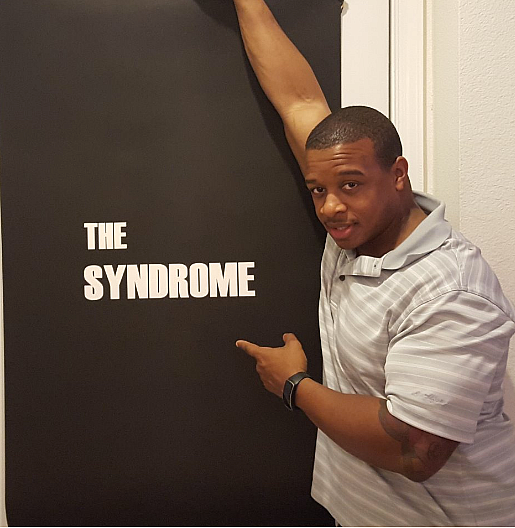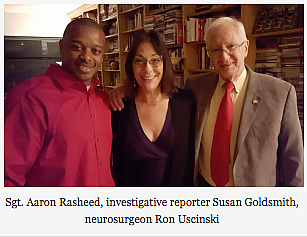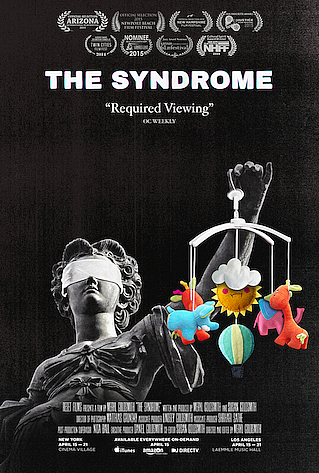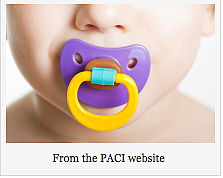'The Syndrome' takes on shaken baby syndrome

Sgt. Aaron Rasheed
After winning 9 awards from 13 nominations at independent film festivals since its premiere in the fall of 2014, “The Syndrome” by Meryl and Susan Goldsmith is now available on demand in North America, the first documentary distributed by trending Freestyle Digital Media.
“This has been an incredible experience,” says Susan Goldsmith, an award-winning investigative reporter who spent years as a print journalist before collaborating with her filmmaker cousin on this examination of shaken baby syndrome. “How we tell the story is helping people figure out what’s going on. To see this kind of response is deeply gratifying.”

Weeks before the screening, Rasheed says, he knew the event was a good idea, when he was contacted by another accused family, who had seen his publicity and wanted to know more. “And I could help them,” he beams. “My wife and I had done a lot of research, and we got to pass that along to a family that needed it.” His efforts had included reaching out to the Goldsmiths after he saw the trailer to “The Syndrome” and reading the book Flawed Convictions, by Deborah Tuerkheimer.

In early March, though, the court accepted a new opinion attributing the boy’s subdural bleeding to a medical condition, and the case was dropped.
Rasheed started organizing the library showing even before he knew he would be cleared. “In Tuerkheimer’s book, it didn’t seem like anyone had a good outcome,” he points out, so he figured he’d better do what he could while he was still free. “And it helped to keep my mind occupied,” he adds, “when I was worried that I would lose my family and maybe go to jail.” Now he’s planning future showings in nearby states.
Free-range parent Lenore Skenazy featured Sgt. Rasheed in the lead to an opinion piece she wrote in the Queens Times Ledger, following a showing of “The Syndrome” in Manhattan in April.
Most of the film’s reviewers have praised both its bold topic and its skillful execution. Flickfilosopher MaryAnn Johanson, for example, nailed it in her subhead:
A smartly dispassionate and skeptical look at “shaken baby syndrome,” and an accidental portrait about how science fails us when it solidifies into dogma
Daphne Howland at The Village Voice said the story is “smartly reported” and wrote:
[The filmmakers] expose the issue with depth and breadth; this well-researched investigation is loaded with credible facts and has a workaday, broadcast-newsmagazine feel.
And Maitland McDonagh wrote in Film Journal International:
[The filmmakers’] thesis is controversial, though not—as they demonstrate at some length—because the hard medical evidence is conspicuously ambiguous. Rather, it conflicts with an emotional narrative rooted in hard-wired human empathy for the weak and helpless.
But the complexity proved too much for critic Frank Scheck at The Hollywood Reporter, who opened his review, “When did it become necessary to have an advanced medical degree in order to go to the movies?” and likened the film to “those unsettling television commercials for medications featuring an endless list of potentially harmful side effects.”
And the Los Angeles Times treatment objected to both the message and the form. The headline read, “‘The Syndrome’ takes a one-sided view of the controversy about shaken baby syndrome,” and the text charged, “The editing is shoddy and inelegant… providing both too much information and not enough.” My favorite line from the review, copied and pasted:
Though the pro-SDS doctors turned down requests for interview, it at times feels like advertising for the doctors who did participate.
I count two typos, the word “it” as the subject, and a general clunkiness, in one short sentence.

“The questions were good,” Bravos reported. “It was a chance to present some good information.”
In the hall outside the screening room, organizers said, polite young women, possibly college students, handed out a fact sheet listing a number of organizations that support the diagnosis of Abusive Head Trauma (AHT) and commenting:
The validity of AHT in all of its various forms has been established and there is no debate among the majority of practicing physicians.
At a pair of screenings in Bloomington Hills, Michigan, on the other hand, the crowd seemed to be entirely in support of the filmmakers, according to a friend of mine who attended. Organized by the Torn Family Trust, which came together last year around the case of Joshua and Brenda Burns, the showings featured in-person appearances by Susan and Meryl Goldsmith, the Burnses, and Julie Baumer, exonerated in 2010 after serving five years for the death of her nephew. On Friday morning before the weekend showings, Fox 2 in Detroit broadcast this interview with the Goldsmiths.
The Pediatric Justice Association in North Carolina also garnered press coverage for its April showing of “The Syndrome,” at a performing arts center in downtown Wilmington.
So “The Syndrome” has joined the debate, big time. Film critics and their readers are being exposed to a new angle on child abuse, and community showings are not only bringing affected families together but also bringing the topic into the press.
“The Syndrome” is not, of course, the final word on the subject, nor is it trying to be. “I’m not sure this was a movie about the science as much as it was about the battle,” reflected Dr. Doug Smith, a retired professor of pathology who writes occasionally about shaken baby syndrome on the Washtenaw Watchdogsblog, “but that was a choice the filmmakers made, and I respect that.”
Although I had hoped for a closer look at the science, I found the film riveting, and I’ve been gratified that so many mainstream reviewers shared that reaction. I’m not surprised, though, that some critics rejected the message or the treatment—the topic is unsettling, and “The Syndrome” is not for anyone looking for escapist entertainment.
One friend of mine, who has spent years working for justice in this arena, offered a perspective I can endorse:
I’m behind the film. “The Syndrome” is not perfect, but it’s much better than I would ever have thought we would have. I wish it would get broader exposure.
For more press reports on “The Syndrome,” you can see:
The sympathetic Los Angeles Weekly review at http://www.laweekly.com/film/the-syndrome-exposes-the-shaken-baby-syndrome-myth-6789457
The Pacific Standard treatment, which explores the topic further, at https://psmag.com/a-new-film-challenges-shaken-baby-syndrome-and-courts-controversy-a768d2415398#.w4rydprh8
An interview on IndieWire with Meryl Goldsmith at http://blogs.indiewire.com/womenandhollywood/meryl-goldsmith-on-fighting-a-medical-standard-in-the-syndrome-20160414
A skeptical look at the film by columnist Carrie Poppy for the Skeptical Inquirer at http://www.csicop.org/specialarticles/show/does_a_new_documentary_prove_shaken_baby_syndrome_doesnrsquot_exist
The CultureFly review at http://culturefly.co.uk/the-syndrome-review/
A short, positive review on CINEMACY at http://cinemacy.com/newport-beach-film-festival-the-syndrome/
An interview with Meryl Goldsmith on Westword at http://www.westword.com/arts/the-syndrome-explores-the-shaken-baby-myth-at-sie-filmcenter-monday-6756370
And more. Slowly, slowly, the word gets out.
If you are not familiar with the debate surrounding shaken baby syndrome, please see the author's web site and blog on the subject.

